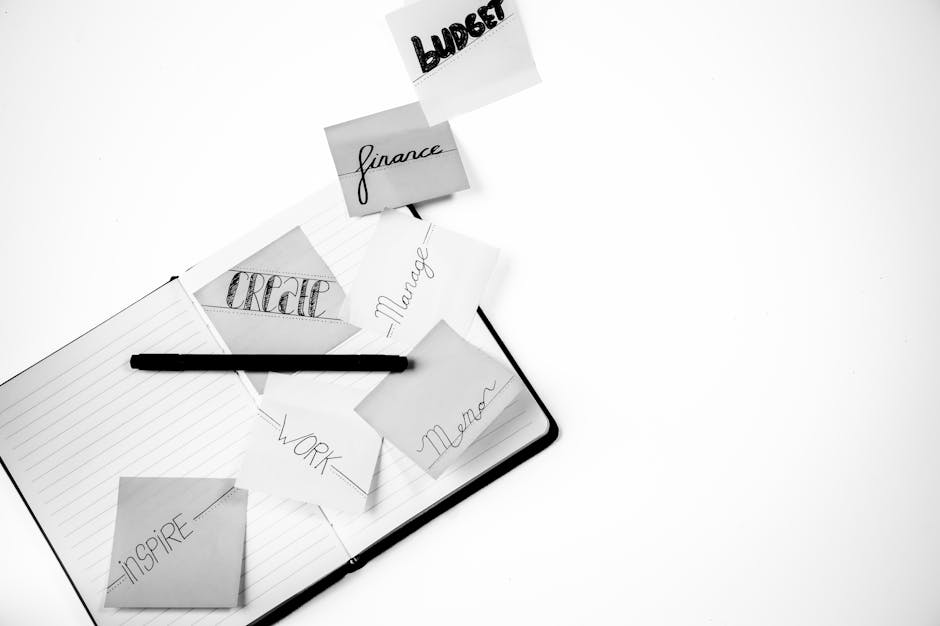Table of Contents
- The Big Myth: Budgeting Is for Broke People (Or Accountants)
- Cutting the Fat: Where Your Money Actually Goes (Spoiler: It’s Not Always What You Think)
- Building the Beast: Giving Your Money a Job (Or Several Jobs)
- The Long Haul: Sticking With It When the Novelty Wears Off
- The Payoff: What You Actually Get (Besides Less Stress)
- The Bottom Line (No BS): Just Do It.
Right, so picture this: it’s maybe 2008, maybe 2009. The world’s gone a bit sideways, hasn’t it? Mortgages blowing up, banks looking like a bunch of chancers who just discovered the free bar, and everyone suddenly staring at their paychecks like they were lottery tickets that came up blank. I was sitting there, same as everyone else, watching the news blather on about ‘recession’ and ‘economic downturn’ and thinking, “Bloody hell, my wallet just got lighter listening to these clowns.” My own finances? Mate, they were about as organised as a jumble sale in a hurricane. Bills were more like suggestions than demands, savings were a myth, and if you’d asked me where my money went, I’d have just shrugged and said, “Dunno, disappeared into the ether, probably on some overpriced coffee and a bet on a horse that came in last.”
That’s when it hit me, proper hard: you can talk about the big economic picture all you want, but if you don’t even know where your own bloody tenner is going, you’re just adrift. It was a proper wake-up call, that. Made me realise a lot of us are just flying blind with our cash, hoping for the best, and usually getting the short end of the stick. And let’s be honest, for all the fancy apps and advice out there these days, most of it sounds like it’s written by someone who’s never actually had to choose between paying the electricity bill and, say, eating something other than instant noodles for a week.
The Big Myth: Budgeting Is for Broke People (Or Accountants)
So, what’s the first thing people usually say when you mention ‘budget’? They either roll their eyes like you just suggested they do their taxes on a Friday night, or they say, “Oh, that’s for when you’re broke.” Or worse, “That’s what accountants do, mate.” And you know what? That’s a load of old cobblers, that is. A budget isn’t some financial straitjacket designed to suck all the joy out of your life. It’s actually more like a bloody satnav for your money. You wouldn’t just jump in your motor and drive from Glasgow to London without a clue where you’re going, would you? You’d end up in bloody Brighton, if you were lucky. Your money’s the same. If you don’t give it some directions, it’s just going to wander off and get itself into trouble.
I mean, look, I’ve seen enough people, from the low-wage grafters to the high-flying suits, all scratching their heads, wondering where their cash went. It’s a common ailment, a universal head-scratcher. And it’s usually because they’ve got no proper handle on what’s coming in and, more importantly, what’s spewing out. My mate Barry, down in Dudley, he’s a prime example. Earns a decent wage, mind you, but every month it’s the same story: “Dunno where it all goes, does it?” Then you see him with a new gadget every other week and a subscription to every streaming service under the sun. It’s not that he’s poor; he’s just got a hole in his pocket the size of the Severn Estuary.
And that’s where something like gomyfinance.com comes into the picture. People ask me, “Can gomyfinance.com really help me create a budget that sticks?” My answer is usually, “Look, a tool’s just a tool, innit? You still gotta pick it up and use it.” But yeah, for the sheer simplicity of it, for cutting out the faff and the waffle, I reckon it’s one of the better ones kicking about. It’s not gonna magically make you rich, obviously, but it can stop you from wondering why you’re always a quid short by the end of the month.
Why We All Need to Stop Being Financial Ostrichers
It’s astonishing, really, how many people would rather stick their heads in the sand than look at their bank statements. Like it’s some sort of monster under the bed. But here’s the thing: that monster gets bigger the longer you ignore it. We live in a world where everything’s instant. You want something, you tap a button, it’s yours. Credit cards, buy now pay later schemes, the whole shebang. It’s designed to make you spend. It’s a bloody trap, and unless you’ve got a roadmap for your own cash, you’re going to fall right into it.
I remember my old editor, God rest his cynical soul, used to say, “The only difference between a successful man and a struggling one is usually a notebook and a bit of common sense.” He wasn’t wrong. He was talking about budgets, without even using the word. Just knowing where your money goes, that’s the common sense part. And that’s what a budget, properly done, gives you. It’s not about deprivation; it’s about control. It’s about not getting to payday and wondering why you’re already skint. It’s about knowing where you stand.
Cutting the Fat: Where Your Money Actually Goes (Spoiler: It’s Not Always What You Think)
So you’ve decided to get a grip. Good on ya. The first step, and this is where most people trip up, is figuring out where your hard-earned dosh is vanishing to. You might think you know, but you’d be surprised. I’ve seen folk swear blind they don’t spend much on takeaways, then you look at their bank history and it’s a parade of pizza, curry, and dodgy kebabs. Or the coffee habit. Ten quid a day on fancy lattes might not sound like much, but over a month, that’s a new set of tyres, or a bloody good night out. Over a year? A decent holiday.
This is where tools like gomyfinance.com come in handy. You link your accounts, and it gives you a cold, hard look at your spending. No sugarcoating, no “Oh, it’s just a little treat.” It lays it out in black and white. For some, it’s a proper shocker. It’s like looking in the mirror after a particularly rough weekend, you know? Not pretty, but necessary. My cousin, bless his cotton socks, swore he didn’t spend much on pubs. Then he looked at the app and saw he was basically subsidizing the local brewery. He wasn’t happy, but at least he knew. And knowing is the first step to, well, not doing that anymore. Or at least, doing it less.
The Real Talk: What’s Essential, What’s Just Noise?
Once you see the numbers, you can start making some proper decisions. Not just wishful thinking, but actual, grown-up choices. Rent, mortgage, electricity, food, travel to work – these are the non-negotiables, right? They’re the concrete floor you build on. Everything else? That’s wallpaper, mate. Nice to have, but you can live without it.
What’s interesting is how many people confuse “want” with “need.” I’ve done it myself, countless times. That new gadget, that flash holiday, those extra streaming services. They’re nice, they feel good for a minute, but do they actually improve your life in the long run? Or are they just eating into your ability to save for something genuinely important, like a house deposit, or a rainy-day fund, or just not having to panic when the washing machine packs it in?
Someone asked me once, “Is gomyfinance.com good for tracking all those little expenses that add up?” Yeah, mate, that’s exactly what it’s good for. It’s the small stuff that really kicks you in the shins. The impulse buys, the daily subscriptions you forgot you had, the ‘just one’ beer after work that turns into ‘six more and a taxi’. Those are the things that empty your wallet without you even noticing. It flags them up, screams at you, metaphorically speaking, to pay attention.
Building the Beast: Giving Your Money a Job (Or Several Jobs)
So you’ve seen the damage. Now what? This is the bit where you actually create the budget. And again, gomyfinance.com simplifies it. You give every quid a job. A portion for rent, a portion for food, a portion for transport, a portion for that new pair of trainers you’ve been eyeing up. And crucially, a portion for savings. Yeah, savings. Remember those? Not some mythical beast, just a portion of your money that you tell to bugger off and sit quietly in a separate account.
I believe the biggest mistake people make is thinking they need to be perfectly strict from day one. You don’t. It’s like going on a diet. If you cut out everything you enjoy, you’ll last about three days before you’re face down in a bucket of ice cream. Same with money. Give yourself some wiggle room. If you like your fancy coffee, budget for it. Just don’t let it eat up all your ‘fun’ money. This ain’t about living like a monk, it’s about living smart.
The “Buffer” and The “Treat Yo’self” Fund
Every proper budget needs a “buffer.” That’s the bit that saves your bacon when something unexpected crops up. The car needs a new part, the cat suddenly decides to swallow a shoelace, whatever it is. Life happens. If you’re living paycheck to paycheck, those little surprises become proper disasters. A small buffer means you don’t have to put it on a credit card and dig yourself into a deeper hole. It’s a stress reducer, plain and simple.
Then there’s the “treat yo’self” fund. Yeah, I said it. You work hard, don’t you? You deserve to spend a bit of money on something you actually enjoy, without feeling guilty about it. But here’s the key: it’s budgeted. It’s not an impulse decision born out of desperation or a bad day. It’s a deliberate choice. You’ve earned it, and you’ve allocated for it. That makes all the difference. That’s the difference between spending freely and spending wisely.
The Long Haul: Sticking With It When the Novelty Wears Off
Now, here’s the cynical truth: creating a budget is easy. Sticking to it? That’s where the real graft comes in. It’s like going to the gym. You get all fired up on January 1st, then by February, you’re back on the sofa with a bag of crisps. The trick with budgeting is to make it a habit, not a one-off event. It needs regular check-ups, like a dodgy knee.
In my experience, the folks who stick with it are the ones who check their budget at least once a week. Five minutes, ten minutes tops. Just a quick glance. Are you on track? Are you overspending in one area? Do you need to shift some money around? gomyfinance.com makes this pretty straightforward with its dashboards and little alerts. It ain’t gonna hold your hand, but it’ll certainly give you a nudge when you’re veering off course.
Someone rang me up the other day, “I tried creating a budget on gomyfinance.com, but I keep going over. What am I doing wrong?” Usually, it’s one of two things: either your budget is too restrictive and you’re trying to live on fresh air, or you’re just not paying attention. It’s like trying to lose weight by just looking at the diet plan. You gotta eat the salad, mate. You gotta actually do it. Adjust your budget, be realistic. If you can’t cut out that coffee, then budget for it and find something else to trim. It’s not rocket science; it’s just managing your own expectations and reality.
The Payoff: What You Actually Get (Besides Less Stress)
So, what’s the big prize at the end of all this? Is it a pile of gold? Not usually, no. But it’s something far more valuable: peace of mind. Seriously. Not having that knot of dread in your stomach when the bills come in. Knowing you’ve got a bit of a buffer if the car breaks down. Being able to actually save for something you want – a deposit, a holiday, not having to work until you’re 80. That’s the real payoff.
I’ve seen people transformed, genuinely. My neighbour, used to be drowning in credit card debt, stressed out of his mind. Started using a simple budgeting tool, nothing fancy, just like gomyfinance.com, to get his head around it. Took him a while, obviously, it’s not an overnight miracle. But slowly, steadily, he started digging himself out. Now he’s got a decent emergency fund and he’s actually saving for a deposit on a bigger place. He ain’t rich, but he sleeps better at night, and that, my friends, is priceless.
It gives you options, doesn’t it? When you know where your money is, you can make choices. Do I really need that new phone, or do I want to put that money towards my holiday fund? Do I need another takeaway, or do I want to clear down some of that credit card debt? It moves you from being a passenger in your own financial life to being the one holding the bloody steering wheel. And believe me, that feels a whole lot better.
What About Unexpected Costs? And My Investments?
“What happens if I have an unexpected cost?” you might be wondering. “Does gomyfinance.com help with that?” Well, it helps you prepare for them, which is the whole point of that buffer I mentioned. It’s not going to magically pay for a broken boiler, but by helping you manage your regular cash, it frees up money to build that emergency fund. That’s your first line of defence, a proper solid one, not some flimsy bit of credit.
As for investments, a budget is the bloody groundwork. You can’t build a skyscraper on quicksand, can you? You need a stable financial base before you start throwing money into shares or crypto or whatever the latest fad is. Once you’ve got your income and outgoings sorted, once you’re regularly saving, then you can look at making your money work harder for you. And trust me, having that clear picture from a budgeting tool makes it a lot easier to figure out how much you can realistically put aside for those bigger financial goals. It’s about building a solid foundation first.
The Bottom Line (No BS): Just Do It.
Look, I’m not saying gomyfinance.com is going to solve all your problems. It’s not a magic wand. What it is, though, is a decent, straightforward tool that cuts through a lot of the usual financial jargon and just shows you the numbers. It’s simple, it’s direct, and if you actually use it, it’ll give you a clearer picture of your money than you’ve probably ever had.
We spend our lives chasing the next big thing, the next raise, the next whatever. But sometimes, the smartest thing you can do is just get a grip on what you’ve already got. Stop bleeding cash through a thousand little holes. Stop pretending it’ll all sort itself out. It won’t, mate. It never does.
So, go on. Give it a proper go. Get yourself over to gomyfinance.com, link your accounts, and just stare at the cold, hard truth. It might sting a bit at first. But trust me, knowing where you stand is a hell of a lot better than wondering if you’re gonna have enough for rent come the end of the month. It’s your money. Take control of it. You’ll sleep better for it, reckon so.












